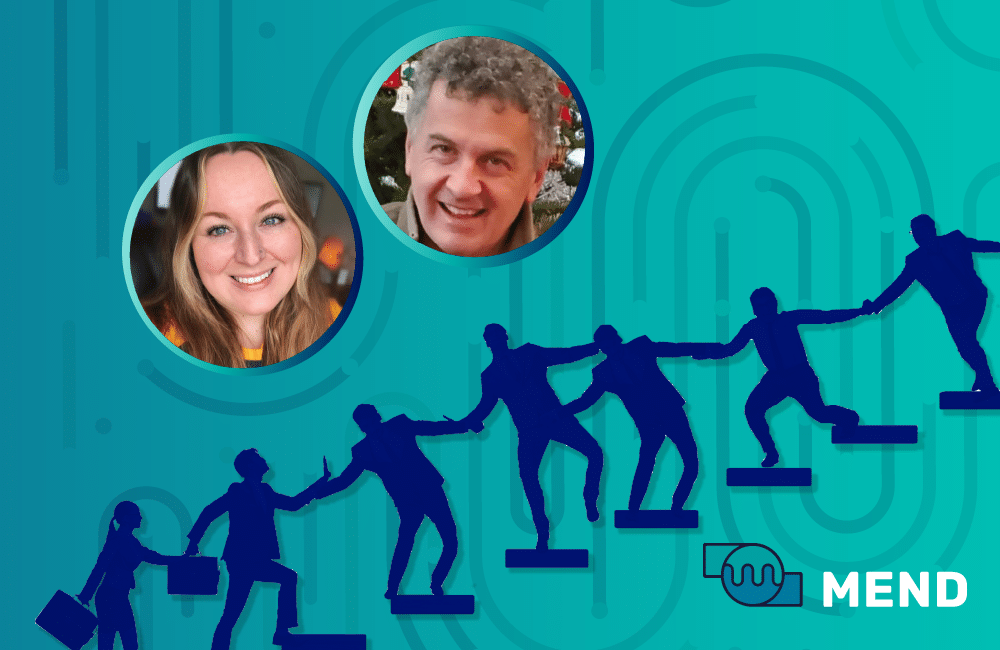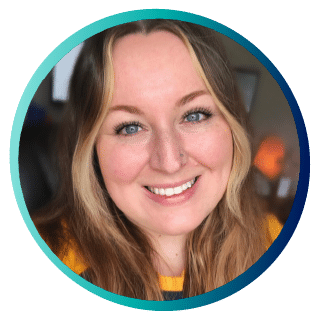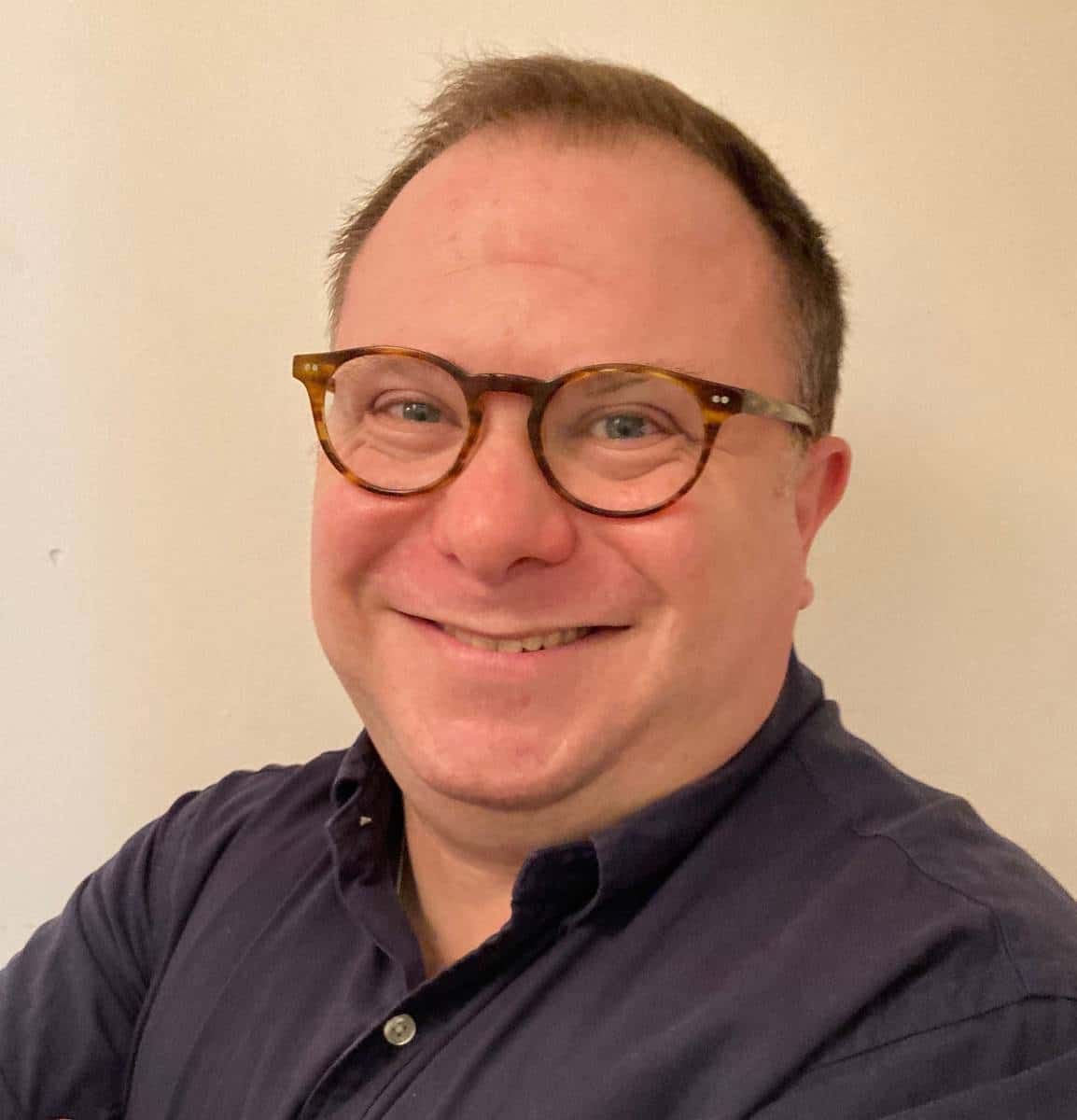How Mentorship Builds Capabilities and Enhances Working Together at Mend


Mend’s mentor program has now begun a new “season”, following the success of the first. The first wave of the program yielded benefits beyond the original goal of helping Menders grow, personally and professionally, and we were eager to see it continue.
By pairing mentees with mentors from different parts of the company, each person gets an insight into what the other does at Mend, and how their experience, knowledge, and expertise contribute to our business. As a result, mentoring partnerships take away from their relationship not just improved knowledge and skills, but a deeper understanding of how other parts of the organization work. One of our values is “better together”, and our mentor program shows this in action. We spoke to another mentor and mentee partnership to get their view on the program and how it helped them be “better together.” Let’s meet them both and hear their story.
Meet the mentee: Angela Ruhstorfer

Angela is a technical enablement specialist on Mend’s Customer Experience team. Newly promoted to this role in September 2022, Angela was previously a technical support engineer since she joined Mend in September 2021. She has been responsible for troubleshooting enterprise customer issues in production environments (including Windows, macOS, and Unix) via diagnostic log analysis, screen-share sessions, and email via Salesforce. She has worked extensively with the customer success team to answer technical product questions and demonstrate product capabilities. She has also worked with the development team to improve future product features.
Angela is also involved in training other support engineers, both in customer service and product technology, and in creating customer-facing technical documentation via Confluence. Her desire to enhance her technical writing skills led her to seek a mentor who could help. That mentor was Hugh Cushing.
Meet the mentor: Hugh Cushing

Hugh is a sales engineer at Mend. He specializes in software technical sales, software development process improvement, and consulting practice management, with a particular focus — naturally at Mend — on application security and application life cycle management.
He joined the company in early 2021,continuing an extensive career as a sales engineer in several technology companies. His experience has spanned the globe, primarily in the U.S., but also Japan and New Zealand.
When the call for volunteer mentors went out at Mend, Hugh jumped at the chance, feeling that it was important to “give something back.”
Aims
Angela joined the mentor program because one of her long-term goals was to become a technical writer and she wanted to hone her writing skills. From a wider perspective, she also felt that a mentoring partnership would give her a new perspective from someone in a different department, with different experience, who has been in the industry for a long time, so that she could glean new knowledge.
Hugh’s motivation was to “give something back.” He said, “In the sales organization, I take a lot of what I need from other people, so I wanted to put a little bit back into the departments and the people who help me a lot. My main objective was to add value to my mentee, namely Angela, through our interactions. For me, if she learned something that she otherwise wouldn’t have known, then that has been a success.”
How the mentoring process worked
When the call went out to Menders to join the mentor program, Angela and Hugh stepped up quickly. Each potential mentee was asked to complete a form explaining what they wanted to achieve from their participation, and each mentor was asked to specify what topics and skills they would feel comfortable teaching.
With this information, our HR team was able to put them in suitable pairs. Then, mentors and mentees were sent to separate seminars with a consultant to learn about goal setting and ways to get the most out of the mentoring process. The program itself took the form of a series of five sessions, over a period of about two months. Angela drove the agenda, which focused each session on examining a document she had been writing, with Hugh playing the role of reviewer and editor. Together they discussed different aspects of her writing, and Hugh gave a different perspective, explaining how the documents can be made more palatable in terms of tone and style, for prospects in a sales cycle, rather than users, with whom Angela is more familiar. Plus, as Angela highlights, “what really distinguished the process was the different mentality, the different point of view with which I could approach an article to write it.”
Priorities, lessons, and results
For Angela, the priority was to learn about technical writing and improve her skills in that area. She concluded that she also benefited from the fact that she was learning a new perspective from Hugh.
“The mentoring program definitely gave me better skills and improved confidence in technical writing,” Angela explained. “Also, Hugh gave me a different point of view since we’re actually two sides of the same coin. He’s sales and I’m in support, so he’s sales and I’m post-sales. This meant that we approached a document with different perspectives: the sales engineer versus the post-sales person, and how the tone of writing can change in these differing contexts.”
For Hugh, it was mainly the satisfaction of sharing his knowledge and his experience, but what he also took away from the mentoring process was more confidence in the value of this knowledge and experience. “I was concerned I might seem presumptuous. Preachy or something like that, but it made me speak my mind. It feels good.”
The process was a success because Angela recently got promoted to the position of technical enablement specialist. One of the main pillars of her new role is producing documentation, which she currently creates on the product side. She also creates technical documentation for issues such as troubleshooting best practices in the technical space.
What makes a good mentor and mentee?
Angela happily confirmed that Hugh was a good mentor. “He was a great mentor, with a gentle presence, and it’s good to know that someone’s coming to you and has volunteered to help you and give you their advice, knowledge, and expertise,” she said.
“It’s important that your mentor is patient and has an open mind and is completely ‘present’ at each mentoring session so that each session is super valuable to you both. And it’s good to have a goal in mind for each session, to keep the whole process on track.”
Hugh echoed the importance for mentors of having an open mind, but he stressed that it’s even more important for the mentee, and to have a genuine commitment to the process.
“You just have to want to do it, I think,” he explains. “Don’t do it if you don’t want to do it. Ask yourself, ‘Are you sure that you want to take the process all the way? Are you certain that you could really use some senior advice?’ As a mentor, you’ll know if someone’s doing it just to check the box or to get their manager off their back or something. It has got to be completely voluntary. It won’t work otherwise.”
Final reflections and the future
Owing to the success of this mentor-mentee partnership, it’s understandable that Angela’s thoughts are positive about the mentorship process and its benefits, both for the individual and for increasing understanding throughout the business.
“I really believe it opens the doors for collaboration by enabling people to reach across the table and gain knowledge from others that you might not otherwise have worked with. It gives you a different perspective. It makes you understand that each department has its own viewpoint and its own role, and we’re all important in the roles we play.”
Angela is poised to continue her involvement, this time as a mentor in the new round of sessions, and she remains open to learning more as a mentee in the future.
